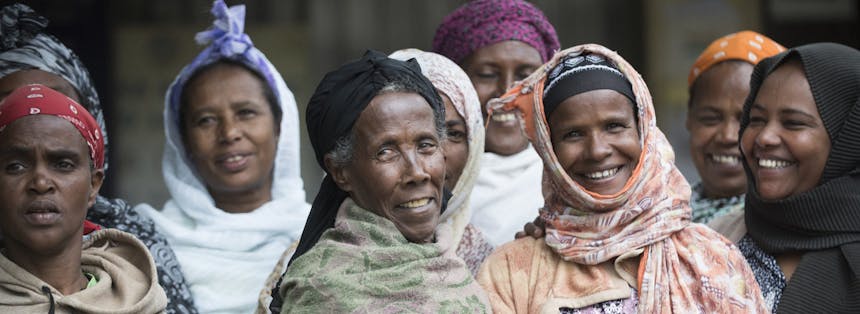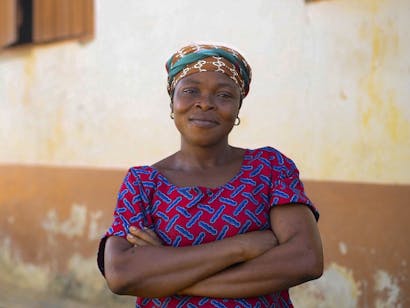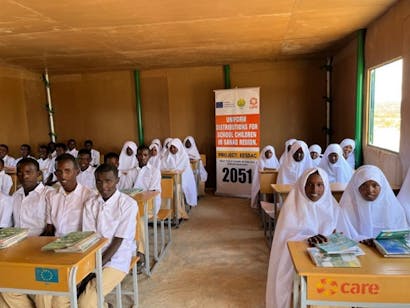Capital growth: Financial grounding
Most low-income women don’t know where to go for loans, how to save or simply have limited understanding about the benefits of saving. Through Village Savings & Loans Associations and the basic business training, the ‘Women for Women’ project gave participants the financial grounding they needed to grow their businesses.

Through the project, it became clear that the women expected CARE to directly fund their business initiatives. This expectation was based on the women’s previous experience of other NGOs operating in their local area. Restricted from working in this way, CARE and Mission for Community Development Program (MCDP) therefore spent much of the project time educating the women about the longer-term benefits of becoming self-sufficient and being able to control their own loans, income and expenditure.
Zegeye Bante, Senior Financial Service Advisor at CARE Ethiopia added:
“Through the project we needed to show the women that we were not a banking exchange, but there to support them in other ways through capacity building support such as business skills training, facilitating market linkages and access to financial services and opening up new opportunities.”
The next step on the ladder
The next step up, where women could access larger loans, providing them with an opportunity to expand their businesses, were the Savings and Credit Cooperatives (SACCOs). These are financial cooperatives made up of individual members and are based on a Government-initiated development model. The Government provides technical support, such as financial literacy training and auditing services.
The ‘Women for Women’ project supported the establishment of six new SACCOs (with 996 members) and a fund totaling 4.2 million birr (US$155,600). This enabled members to access loans on a ‘revolving’ basis where they borrow in turn. The loan is repaid with interest, ensuring the fund is sustainable and continuously growing. Following requests by CARE and MCDP, the Government provided each SACCO with offices, whilst the project provided equipment including computers and office furniture.
“This project has been a learning process, not only for the women concerned, but also the financial institutions that we have been working with. At the start of this project lenders wouldn’t consider our women as potential clients, ‘not now and not ever’. Through showing them the potential of the women, they have begun to see that the women are capable and reliable customers.”
Silke Handley, Programme Director, CARE Ethiopia
Formal finance
Accessing more formal financial institutions for many Ethiopian women remains a challenge, and this does not only apply to those with a low-income. The bank or Micro Finance Institution (MFI) usually requires something that can be used as collateral, such as property. In the majority of cases ownership records are non-existent and where they do exist they are in the man’s name.
CARE and MCDP had long and intensive discussions with a number of banks and MFIs, many of which did not progress due to the expectation that CARE would guarantee a large percentage of any loans given. However, with persistence, CARE and MCDP opened up new opportunities for the women by signing an agreement with Addis Capital Goods. This agreement resulted in terms and conditions, such as loan repayment times, that were tailored specifically to the women from the project. CARE provided temporary mechanisms to minimise the risks. Addis Capital Goods is a leasing company providing in-kind loans. They enabled the women to access items such as refrigerators, washing machines or stoves to support their businesses. The women then pay back the loan over a one to three year period. As a result of this agreement 103 women from the project were able to access 2.5 million birr’s worth of in-kind loans (US$ 92,600).
The ‘Women for Women’ project promoted an inclusive financial sector, where marginalised low-income women were included as regular customers. However, many barriers still exist. These barriers, including: culture; lack of traditional collateral; and lower levels of income compared to men, are not well understood or considered by most financial providers. CARE is determined to change this, and through the project, delivered a ‘training of trainers’ to 24 MFI field workers. This helped them to understand the context of poor women and their businesses. It also showed them how to support and coach the women and provide tailored services, which in turn improved the performance of women-led enterprises.
For the future, CARE and MCDP will continue to work in partnership with other NGOs and Government to develop innovative solutions, so that these women from very poor communities can access the capital they need to grow their businesses.
Photo credit: Michael Tsegaye/CARE
Read the Collective Power report on women entrepreneurs in Ethiopia here


